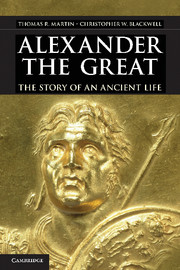Book contents
- Frontmatter
- Contents
- Acknowledgments
- Introduction: The Goal of this Book
- Map 1: European Greece, Macedonia, and Northern Lands
- Map 2: Alexander's Expedition
- 1 The World of Alexander's Birth and His Education in Literature and Warfare (350s and 340s BC)
- 2 Opportunities and Risks asa Teenager (340s to 338 BC)
- 3 The Danger in Replacing a Murdered Father as King (337 to 335 BC)
- 4 The Opening Battles Against the Persian Army (334 to 332 BC)
- 5 Finding God in Egypt and Capturing the Riches of Persia (332 to 330 BC)
- 6 Winning the World as King of Asia (330 to 329 BC)
- 7 Murder, Marriage, and Mixing Customs in Afghanistan (329 to 327 BC)
- 8 Victory and Frustration in India (327 to 326 BC)
- 9 Returning to Babylon and Becoming Divine (326 to 323 BC)
- 10 Remembering and Judging Alexander (323 BC to Now)
- Suggested Readings
- Index
Suggested Readings
Published online by Cambridge University Press: 05 November 2012
- Frontmatter
- Contents
- Acknowledgments
- Introduction: The Goal of this Book
- Map 1: European Greece, Macedonia, and Northern Lands
- Map 2: Alexander's Expedition
- 1 The World of Alexander's Birth and His Education in Literature and Warfare (350s and 340s BC)
- 2 Opportunities and Risks asa Teenager (340s to 338 BC)
- 3 The Danger in Replacing a Murdered Father as King (337 to 335 BC)
- 4 The Opening Battles Against the Persian Army (334 to 332 BC)
- 5 Finding God in Egypt and Capturing the Riches of Persia (332 to 330 BC)
- 6 Winning the World as King of Asia (330 to 329 BC)
- 7 Murder, Marriage, and Mixing Customs in Afghanistan (329 to 327 BC)
- 8 Victory and Frustration in India (327 to 326 BC)
- 9 Returning to Babylon and Becoming Divine (326 to 323 BC)
- 10 Remembering and Judging Alexander (323 BC to Now)
- Suggested Readings
- Index
Summary
For Arrian, Curtius, and Diodorus, and Plutarch, as well as Homer, Euripides, and Herodotus, the Loeb Classical Library editions (Cambridge, Mass.: Harvard University Press) offer readable English translations alongside the original language of the ancient sources. For Justin, see J. C. Yardley's translations: Justin. Epitome of the Philippic History of Pompeius Trogus (Atlanta: Scholars Press, 1994), and Justin. Epitome of the Philippic History of Pompeius Trogus. Volume I. Books 11–12: Alexander the Great. Commentary by Waldemar Heckel (Oxford: Oxford University Press, 1997). Charles A. Robinson, The History of Alexander the Great. Vol. 1 (Providence: Brown University, 1953) translates the “fragments” of the “lost” historians of Alexander, meaning quotations and paraphrases of earlier ancient sources found in later, surviving sources.
Modern studies of Alexander are overwhelmingly numerous and diverse. Waldemar Heckel and Lawrence A. Tritle, editors, Alexander the Great: A New History (Chichester, U.K. and Malden, Mass.: Wiley-Blackwell, 2009), pp. 311–348 provide an extensive bibliography. Waldemar Heckel, Who's Who in the Age of Alexander the Great: Prosopography of Alexander's Empire (Malden, Mass. and Oxford: Blackwell, 2006) gives short descriptions, including source citations, for many individuals known from the history of Alexander. The spectrum of modern interpretations of Alexander's personality and aims ranges from the visionary leader promoting the “brotherhood of man” imagined by William Woodthorpe Tarn in Alexander the Great (Cambridge: Cambridge University Press, 1948) to the near sociopath seemingly unable to sate his blood lust conceived by Ernst Badian in “Alexander the Great and the Loneliness of Power,” in Studies in Greek and Roman History (Oxford: Oxford University Press, 1964), pp. 192–205, and by A. B. Bosworth in Conquest and Empire: The Reign of Alexander the Great (Cambridge: Cambridge University Press, 1988) and Alexander and the East: The Tragedy of Triumph New ed. (Oxford: Oxford University Press, 2004).
- Type
- Chapter
- Information
- Alexander the GreatThe Story of an Ancient Life, pp. 185 - 186Publisher: Cambridge University PressPrint publication year: 2012



